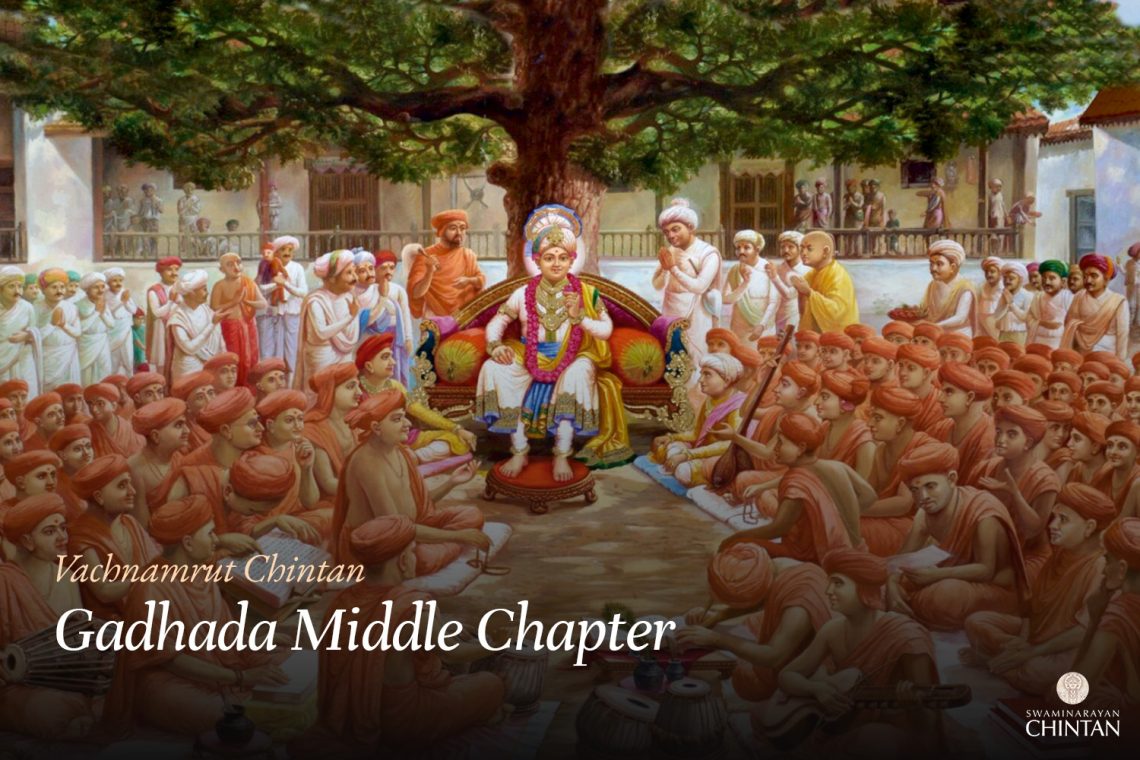Central Insights:
- The great ones are only pleased when no malicious intent remains within.
Key Points:
- Strong impressions (samskaras) are required to suppress one’s natural tendencies.
- A person who behaves improperly towards the poor will eventually behave improperly towards God as well.
Explanation:
In this Vachanamrut, Shriji Maharaj asked Muktanand Swami: “What causes you to get angry, and how severe must the cause be for you to get angry?” He further added: “Personally, I do not get angry, even if someone causes me a loss of one hundred thousand rupees. In fact, I never get angry for my own sake. I only get angry when someone violates dharma (righteousness) – my anger arises to protect dharma – or when a strong person oppresses the weak, or when someone supports injustice. In such cases, my anger is solely for the protection of the weak or for the sake of justice.”
Muktanand Swami responded, “I get angry when someone behaves improperly, but my anger subsides immediately.” Maharaj asked, “What understanding allows you to suppress your anger?” Muktanand Swami replied, “I have understood the greatness of God, and I know that it is improper to have any behavior that displeases God. Therefore, I keep myself free of such tendencies, with the desire to please God. Furthermore, I have decided to live a pure life like the great sages Shuk and Jadbharat. That is why my anger subsides.”
Maharaj then commented, “Your thought process is strong because it helps control your natural impulses. This is due to the powerful samskaras (impressions from past lives) within you. From what I can see, initially, you are affected by the circumstances, but in the end, you break free from that bondage.”
Muktanand Swami asked, “Maharaj, what is the cause of my momentary weakness that allows me to be influenced initially?” Shriji Maharaj replied, “The influence of Desh, Kal (time), and other factors is as strong as the effect of one’s past deeds. These eight factors can suppress the influence of past samskaras. When someone encounters unfavorable circumstances, even their past good deeds cannot prevent them from being affected. However, if only past deeds determined one’s actions, then the rules and vidhi-nishedh (do’s and don’ts) set forth by the Vedas would become meaningless. But the teachings of the scriptures and the great sages cannot be wrong.”
Maharaj further explained, “The great ones are only pleased when no form of malicious intent remains within. If someone holds malicious thoughts towards the poor, they will eventually harbor such thoughts towards God as well. Therefore, if there is any malicious intent in one’s heart, neither God nor the great saints will be pleased. For instance, if someone harms a poor person, disregards the limits of dharma, or oppresses the weak, they will eventually behave the same way towards God. Whatever weakness is displayed towards the poor or towards small devotees will manifest in their relationship with God as well. Thus, one should never mistreat or hurt the poor or humble devotees; instead, they should be treated with kindness.”
Maharaj also reflected, “Excessive compassion or renunciation can actually hinder bhakti (devotion) to God. If renunciation and compassion aid in bhakti or upasana (devotional worship), they are beneficial. However, if they hinder devotion, they should be limited. Therefore, it is necessary to maintain a balance in life. Maharaj further elaborated that too much compassion or too much renunciation can destroy bhakti. Only when there is balance, and priority is given to devotion and upasana, while renunciation and compassion are given their due, can the path to spiritual welfare remain uninterrupted.”
Additionally, compassion arises from the emotional softness of the heart, while upasana stems from a reverence for God. The firm desire to serve a respected entity can be called upasana. Without heartfelt emotion, service becomes mere labor; similarly, without service, devotion is reduced to mere words. Service and heartfelt devotion are complementary. When emotions increase, so does the inclination to serve. Conversely, as service increases, emotions deepen. Yet, serving God holds greater importance than emotional devotion alone.
| Renunciation | Devotion |
| 1. In renunciation, there is a tendency to be worshiped. | 1. In devotion, there is a tendency to worship others. |
| 2. In renunciation, there is a tendency to detach and cut bonds. | 2. In devotion, there is a tendency to connect and bind with love. |
| 3. In the world, renunciation often appears grand and gains respect. People worship the renunciant. | 3. In the world, devotion may seem selfish or weak, but only God recognizes its true value. |
| 4. There is a greater chance of developing pride in renunciation. | 4. There is a greater chance of developing humility in devotion. |
| 5. It is accompanied by harshness. | 5. It is accompanied by gentleness. |
| 6. Without the help of bhakti, renunciation bears no fruit. | 6. Without renunciation, devotion may lead to bondage. |
Glossary
| Samskaras – Impressions from past lives Deep-rooted tendencies or habits carried over from previous births that influence one’s behavior and thoughts. |
| Desh – Place The environment in which a person resides, which influences their thoughts and behavior. |
| Kal – Time The influence of the time period or era on a person’s tendencies and inclinations. |
| Vidhi-Nishedh – Do’s & Don’ts outlined by Scriptures |
| Malicious Intent – Negative or harmful thoughts |
| Bhakti – Devotion Loving and selfless worship of God. |
| Bhakta – Devotee A follower of Bhagwan who performs actions solely for His pleasure and service, freeing them from bondage. |
| Upasana – Worship and devotion The practice of deep meditation and attachment to Bhagwan. |

